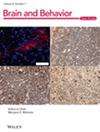The Relationship Between Attention and Suicidal Ideation Among Patients With Adult-Onset Chronic Schizophrenia
Abstract
Background
Patients with chronic schizophrenia (SZ) have a high risk of suicide, and their cognition function is impaired. We aimed to explore the relationship between attention and suicidal ideation among patients with adult-onset chronic SZ.
Methods
A total of 416 patients with adult-onset chronic SZ were enrolled in this study. We divided patients into suicidal ideation group and non-suicidal ideation group according to the evaluation results of the Beck Scale for Suicide Ideation. Psychotic symptoms were measured by Positive and Negative Syndrome Scale (PANSS), and cognitive function was measured by Repeatable Battery for the Assessment of Neuropsychological Status (RBANS). Insomnia symptoms were measured by Insomnia Severity Index (ISI).
Results
Age was significantly different (44.28 ± 10.58 vs. 48.46 ± 12.23, t = 10.64, p = 0.001) between the two groups, and the patients with suicidal ideation were younger than patients without suicidal ideation. The positive symptom scores of the PANSS, the scores of ISI, and attention scores of RBANS were higher in patients with suicidal ideation than patients without suicidal ideation (17.30 ± 5.67 vs. 15.58 ± 4.90, t = 9.633, p = 0.002; 3.00 [1.00–6.00] vs. 2.00 [1.00–3.50], Z = −2.048, p = 0.041; 81.80 ± 14.99 vs. 76.91 ± 13.88, t = 10.101, p = 0.002). In the logistic regression analysis, age (odds ratio [OR], 0.973; 95% confidence interval [95%CI], [0.955–0.992]; p = 0.005), positive symptom scores of PANSS (OR, 1.063; 95%CI, [1.019–1.109]; p = 0.005), ISI scores (OR, 1.098; 95%CI, [1.037–1.163]; p = 0.001), and attention scores of RBANS (OR, 1.029; 95%CI, [1.013–1.047]; p = 0.001) were independently associated with the occurrence of suicidal ideation among patients with adult-onset chronic SZ.
Conclusions
High attention scores of RBANS were a risk factor for suicidal ideation among patients with adult-onset chronic SZ.

 求助内容:
求助内容: 应助结果提醒方式:
应助结果提醒方式:


